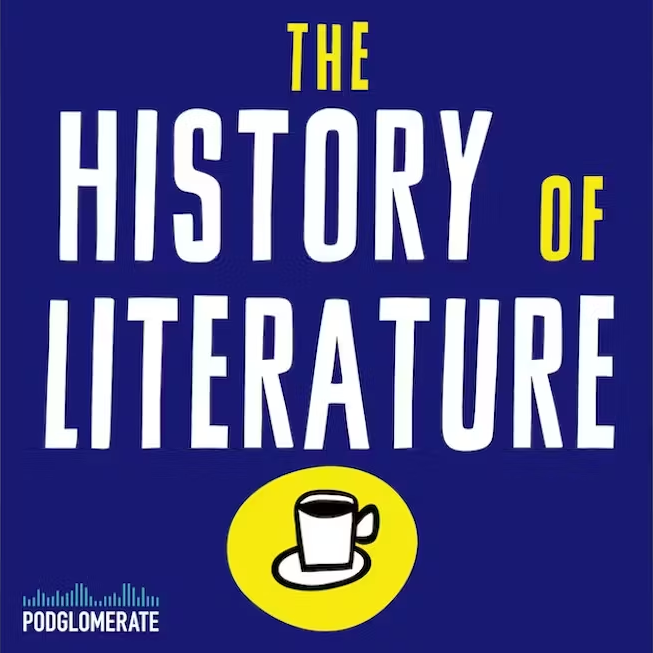Literature
-
The History of Literature #521 — The Empress Messalina (with Honor Cargill-Martin) | My Last Book with Robert Chandler
The empress Messalina, third wife of the Roman emperor Claudius, was a ruthless, sexually insatiable schemer – or was she? But while the stories about her are wild (nightly visits to a brothel, a 24-hour sex competition), the real story is much more complex. In this episode, Jacke talks to historian Honor Cargill-Martin about her… Continue reading
-
The History of Literature #520 — “An Occurrence at Owl Creek Bridge” by Ambrose Bierce
Kurt Vonnegut Jr. called it, simply, the greatest American short story. In this episode, Jacke takes a look at Ambrose Bierce and his masterpiece, “An Occurrence at Owl Creek Bridge.” Help support the show at patreon.com/literature or historyofliterature.com/donate. The History of Literature Podcast is a member of Lit Hub Radio and the Podglomerate Network. Learn more at www.thepodglomerate.com/historyofliterature. Continue reading
-
The History of Literature #517 — The Marquis de Sade
The Marquis de Sade (1740-1814) was more than just a rake or a cad – based on his egregious conduct, he clearly belonged in prison, and one sympathizes with the father who aimed a pistol at Sade’s chest and pulled the trigger, hoping to end the demon’s life. (The gun misfired.) But what about Sade’s… Continue reading
-
The History of Literature #513 — The Writers of Northern Ireland (with Alexander Poots) | My Last Book with Laura Lee
The literary world has long celebrated the incredible contributions of Ireland and its writers, with a special focus on Dublin-centric writers like James Joyce and W.B. Yeats. Meanwhile, Northern Ireland has been quietly turning out some excellent work as well, thanks to figures like C.S. Lewis and Seamus Heaney, among many others. Are there common… Continue reading
-
The History of Literature #512 — Hannah Arendt (with Samantha Rose Hill) | My Last Book with Scott Carter
Born to a German-Jewish family in 1906, Hannah Arendt became one of the most renowned political thinkers of the twentieth century. Her works, including The Origins of Totalitarianism, The Human Condition, and Eichmann in Jerusalem, have never been more relevant than they are today. In this episode, Jacke talks to author Samantha Rose Hill about her biography Hannah… Continue reading
-
The History of Literature #511 — Annie Ernaux, Winner of the 2022 Nobel Prize for Literature (with Alison Strayer) | My Last Book with Bob Blaisdell
Jacke talks to Alison Strayer, translator of several books by French author Annie Ernaux, who won the Nobel Prize for Literature in 2022. PLUS he talks to author and Chekhov expert Bob Blaisdell about his choice for the last book he will ever read. ANNIE ERNAUX (The Years, Getting Lost) has written some twenty works of… Continue reading
-
The History of Literature #510 — The Figure in the Carpet by Henry James (Part 2)
Does a famous author’s body of work contain a hidden meaning? Part Two of Jacke’s look at the classic Henry James novella, “The Figure in the Carpet.” Additional listening suggestions: Help support the show at patreon.com/literature or historyofliterature.com/donate. The History of Literature Podcast is a member of Lit Hub Radio and the Podglomerate Network. Learn more at www.thepodglomerate.com/historyofliterature. Continue reading
-
The History of Literature #507 — The Class of 1989 – A Special Year in Black Cinema (with Len Webb and Vincent Williams)
For years, pop culture critics Len Webb and Vincent Williams have hosted the podcast The Micheaux Mission, which aims to watch and review every Black film ever released. In this episode, Jacke talks to Len and Vincent about their new limited-run series The Class of 1989, which focuses on six films (Harlem Nights, Lean on Me,… Continue reading
-
The History of Literature #505 — Ford Madox Ford (with Max Saunders) | My Last Book with Bethanne Patrick
Ford Madox Ford lived a fascinating life, surrounded by some of the most famous writers of the era: Joseph Conrad, H.G. Wells, Henry James, Stephen Crane, D.H. Lawrence, Jean Rhys, Ernest Hemingway, and many others. Today, he’s best known for his editing of others and for his modernist classics The Good Soldier (1915) and the Parade’s End tetralogy (1924-8).… Continue reading
-
The History of Literature #504 — Persuasion (Book Two) (with Mike Palindrome) | My Last Book with Juliette Bretan
Persuaded by the well-meaning Lady Russell, Anne Elliot turns down prospective suitor Frederick Wentworth. Will life give her a second chance at love? And if so, can she persuade herself to take it? In this episode, Jacke talks to Mike Palindrome, President of the Literature Supporters Club, about the second half of Jane Austen’s Persuasion (1817). PLUS… Continue reading
